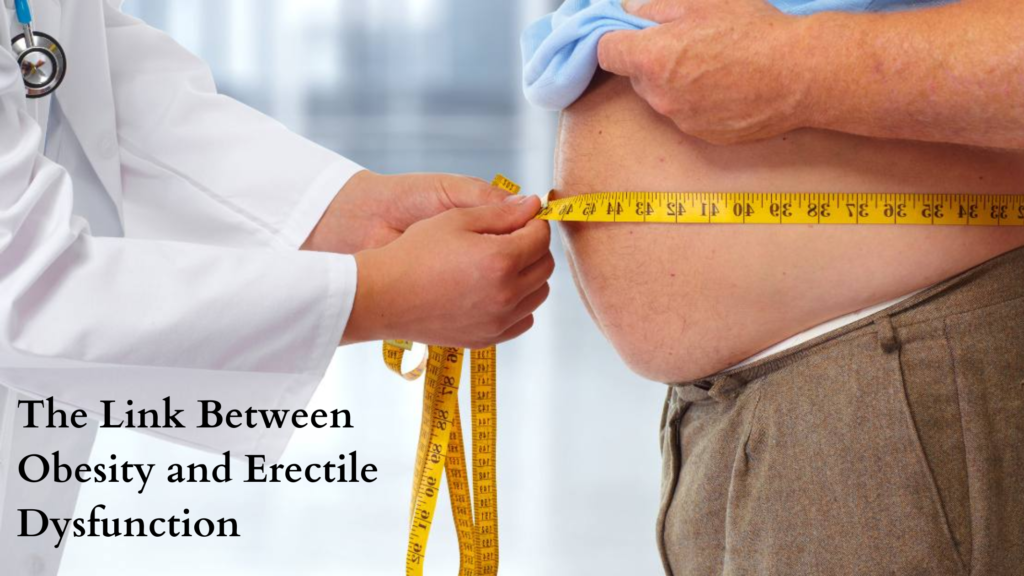
In today’s fast-paced world, health concerns often take centre stage. Among these concerns, obesity stands out as a pervasive issue, affecting millions worldwide. But beyond the visible effects on physical health and well-being, obesity also casts a shadow over one’s intimate life, intertwining with a condition that many find difficult to discuss openly: erectile dysfunction (ED).
The connection between obesity and ED may not be immediately apparent, but it’s a relationship that researchers and healthcare professionals have been unravelling over recent years. Obesity, characterized by an excess of body fat, isn’t merely a matter of appearance—it’s a complex medical condition with far-reaching implications, one of which is its impact on sexual health.
In this blog, we embark on a journey to explore the intricate link between obesity and erectile dysfunction. We’ll delve into the physiological mechanisms, risk factors, and the profound implications this connection has on men’s health and quality of life. Understanding this relationship is not just about awareness but also about empowering individuals to take proactive steps towards better health and improved sexual function. So, let’s navigate through the nuances of this often-overlooked but critical aspect of men’s health.
Understanding Obesity and Erectile Dysfunction
Obesity is more than just a cosmetic issue, it is a complex medical condition associated with numerous comorbidities, including cardiovascular disease, diabetes, and hypertension. Recent research has elucidated its role in the development and exacerbation of erectile dysfunction. The physiological mechanisms linking obesity and ED are multifactorial, involving hormonal imbalances, vascular dysfunction, and psychological factors.
Hormonal Imbalances
Hormonal imbalances play a crucial role in understanding the link between obesity and erectile dysfunction (ED). Obesity, characterized by excessive accumulation of body fat, particularly visceral fat, triggers a cascade of hormonal changes that can disrupt the delicate balance of hormones involved in sexual function. These hormonal disturbances contribute significantly to the development and exacerbation of ED in obese individuals.
Leptin: Leptin is a hormone primarily produced by adipose tissue (fat cells) and plays a key role in regulating appetite and energy expenditure. In obesity, the secretion of leptin increases proportionally with the expansion of adipose tissue. However, obese individuals often exhibit a condition known as leptin resistance, wherein despite high circulating levels of leptin, the body fails to respond adequately to its signals. This leptin resistance disrupts normal hormonal signalling pathways and has been associated with various metabolic abnormalities, including reduced testosterone levels.
- Reduced Testosterone Levels: Elevated levels of leptin in obesity have been linked to reduced testosterone production in the testes. Leptin exerts inhibitory effects on the hypothalamic-pituitary-gonadal (HPG) axis, which regulates testosterone synthesis and secretion. Specifically, high levels of leptin suppress the release of gonadotropin-releasing hormone (GnRH) from the hypothalamus, thereby diminishing the secretion of luteinizing hormone (LH) and follicle-stimulating hormone (FSH) from the pituitary gland. LH and FSH are essential for stimulating testosterone production in the testes. Consequently, decreased LH and FSH levels lead to lower testosterone synthesis, contributing to hypogonadism—a condition characterized by insufficient testosterone production. Hypogonadism is a well-established risk factor for ED, as testosterone plays a pivotal role in regulating libido, erectile function, and overall sexual health.
Sex Hormone-Binding Globulin (SHBG): SHBG is a protein synthesized primarily by the liver, responsible for binding to circulating sex hormones, including testosterone and estradiol (a form of estrogen). By binding to testosterone, SHBG regulates its bioavailability and metabolic clearance rate. In obese individuals, decreased levels of SHBG are commonly observed, resulting in reduced binding capacity for testosterone.
- Diminished Bioavailability of Testosterone: With lower levels of SHBG, a greater proportion of circulating testosterone remains unbound or “free.” While free testosterone is biologically active and readily available for tissue uptake, excessive amounts can lead to increased conversion to estradiol—a process known as aromatization. Elevated estradiol levels further exacerbate hormonal imbalances and contribute to sexual dysfunction in obese men. Moreover, the decreased binding of testosterone to SHBG results in reduced transport of testosterone to target tissues, including the penis, where it exerts its effects on erectile function.
Vascular Dysfunction
Vascular dysfunction is a fundamental aspect of the connection between obesity and erectile dysfunction (ED). It involves the impairment of blood vessel function, particularly in the arteries supplying blood to the penis. In obese individuals, chronic inflammation and endothelial dysfunction, which are characteristic features of obesity, disrupt the normal functioning of blood vessels, leading to compromised penile blood flow and subsequent difficulties in achieving and maintaining erections.
Chronic Inflammation: Obesity is associated with a state of chronic low-grade inflammation throughout the body. Adipose tissue, especially visceral fat, secretes pro-inflammatory cytokines and chemokines, such as tumour necrosis factor-alpha (TNF-alpha), interleukin-6 (IL-6), and C-reactive protein (CRP). These inflammatory mediators contribute to endothelial dysfunction, a condition characterized by impaired function of the endothelium—the inner lining of blood vessels.
- Endothelial Dysfunction: The endothelium plays a crucial role in regulating vascular tone and blood flow by producing vasoactive substances, including nitric oxide (NO), prostacyclin, and endothelin-1. In obesity, increased levels of inflammatory cytokines disrupt the balance between vasodilators (such as NO) and vasoconstrictors, leading to endothelial dysfunction. As a result, the ability of blood vessels to dilate in response to sexual stimulation is impaired, limiting the influx of blood into the penis during arousal and hindering the achievement of a firm erection.
Atherosclerosis: Obesity is a major risk factor for atherosclerosis, a condition characterized by the buildup of plaque within the walls of arteries. Atherosclerosis narrows the lumen of blood vessels, reducing blood flow to various organs and tissues, including the penis. The penile arteries are relatively small and susceptible to narrowing due to atherosclerotic plaque deposition, compromising blood flow to the erectile tissue.
- Impaired Penile Blood Flow: Reduced blood flow to the penis compromises erectile function, as erections rely on the dilation of penile arteries and the subsequent influx of blood into the corpora cavernosa—a pair of sponge-like erectile tissues within the penis. In obese individuals with atherosclerosis, the narrowed penile arteries limit the delivery of oxygenated blood to the corpora cavernosa, impairing the ability to achieve and sustain erections of sufficient rigidity for sexual intercourse.
Psychological Factors
Psychological factors play a crucial role in understanding the relationship between obesity and erectile dysfunction (ED). Beyond the physiological mechanisms, the psychological impact of obesity can significantly contribute to the development and exacerbation of sexual dysfunction. Several interconnected factors contribute to this complex relationship:
Body Image Concerns: Obesity often leads to negative perceptions of body image and self-esteem. Individuals may experience dissatisfaction with their physical appearance due to societal norms and unrealistic standards of beauty perpetuated by media and cultural influences. As a result, obese individuals may feel self-conscious and insecure about their bodies, including their sexual attractiveness. Body image concerns can create barriers to intimacy and sexual fulfilment, leading to performance anxiety and erectile difficulties.
Anxiety and Depression: The psychological burden of obesity extends beyond body image concerns and encompasses broader mental health issues such as anxiety and depression. Obese individuals may experience heightened levels of stress and anxiety related to their weight, health concerns, and social interactions. Anxiety, in particular, can manifest as performance anxiety during sexual activity, leading to fear of failure and avoidance of sexual intimacy. Depression, characterized by persistent feelings of sadness and hopelessness, can also contribute to decreased libido and sexual interest, further exacerbating erectile dysfunction.
Societal Stigma: Obese individuals often face societal stigma and discrimination, which can profoundly impact their mental well-being and interpersonal relationships. Weight bias and prejudice are pervasive in various social settings, including healthcare, employment, and media portrayals. Such experiences of stigma can contribute to feelings of shame, guilt, and social isolation, which may disrupt intimate relationships and exacerbate sexual dysfunction. Fear of judgment or rejection from partners can create barriers to communication and intimacy, further perpetuating the cycle of distress and sexual dissatisfaction.
Relationship Issues: Obesity can strain intimate relationships, leading to conflicts, misunderstandings, and diminished emotional intimacy. Partners may struggle to navigate the challenges associated with obesity, including lifestyle differences, dietary habits, and physical limitations. Communication breakdowns and unresolved conflicts can erode trust and intimacy, creating emotional distance and sexual dissatisfaction. Relationship discord and lack of emotional connection contribute to sexual dysfunction, as feelings of intimacy and closeness are integral to healthy sexual relationships.
Risk Factors and Epidemiological Insights
Epidemiological studies have consistently demonstrated a strong association between obesity and erectile dysfunction. Men with a body mass index (BMI) above 30 are at significantly higher risk of developing ED compared to their lean counterparts. Furthermore, the severity of obesity correlates with the severity of erectile dysfunction, emphasizing the importance of weight management in preserving sexual health.
Prevention and Management Strategies
Prevention and management strategies for addressing obesity-related erectile dysfunction encompass a multifaceted approach that targets both lifestyle modifications and medical interventions. By addressing the root causes of obesity and promoting overall health, individuals can mitigate the risk of developing erectile dysfunction and improve sexual function. Here’s a detailed explanation of these strategies:
Lifestyle Modifications
Dietary Changes: Adopting a balanced and nutritious diet is essential for weight management and overall health. Emphasize whole foods such as fruits, vegetables, lean proteins, and whole grains, while limiting the intake of processed foods, refined carbohydrates, and sugary beverages. A diet rich in fibre, antioxidants, and essential nutrients supports weight loss efforts, improves metabolic health, and enhances vascular function—all of which are crucial for preventing erectile dysfunction.
Regular Exercise: Incorporating regular physical activity into daily routine is paramount for weight management and cardiovascular health. Aim for a combination of aerobic exercise, such as brisk walking, jogging, or cycling, and strength training exercises to build muscle mass and improve metabolic rate. Exercise promotes weight loss by burning calories and increasing energy expenditure, while also enhancing blood circulation and vascular function. Regular physical activity has been shown to improve erectile function and reduce the risk of developing ED in obese individuals.
Medical Interventions
Pharmacotherapy: In some cases, medical interventions may be recommended to aid in weight loss and improve metabolic health. Prescription medications such as appetite suppressants, lipase inhibitors, or anti-obesity drugs may be prescribed under the supervision of a healthcare provider to help individuals achieve and maintain weight loss goals. Additionally, medications that target specific metabolic pathways, such as glucagon-like peptide-1 (GLP-1) agonists or sodium-glucose cotransporter-2 (SGLT-2) inhibitors, may be beneficial in managing obesity and its associated complications.
Bariatric Surgery: For severely obese individuals who have not achieved adequate weight loss through lifestyle modifications or medication, bariatric surgery may be considered as a treatment option. Bariatric procedures such as gastric bypass, sleeve gastrectomy, or gastric banding can lead to significant and sustained weight loss, resulting in improvements in metabolic health, cardiovascular function, and overall quality of life. Bariatric surgery has been shown to have beneficial effects on erectile function, with many patients experiencing improvements or resolution of ED following surgery.
Behavioural Interventions
Counselling and Support: Psychological counselling, support groups, and behavioural therapy can be invaluable resources for individuals struggling with obesity and its associated complications. Addressing underlying emotional issues, developing coping strategies, and setting realistic goals can empower individuals to make positive lifestyle changes and adhere to long-term weight management strategies. Support from healthcare professionals, peers, and loved ones plays a crucial role in maintaining motivation and accountability throughout the weight loss journey.
Stress Management: Managing stress through relaxation techniques, mindfulness practices, and stress-reducing activities such as yoga or meditation can support weight loss efforts and improve overall well-being. Chronic stress has been linked to weight gain, emotional eating, and metabolic dysfunction, all of which can contribute to obesity and erectile dysfunction. By incorporating stress management techniques into daily routines, individuals can reduce stress levels, improve coping mechanisms, and enhance resilience in the face of life’s challenges.
Conclusion
By adopting a holistic approach that combines lifestyle modifications, medical interventions, and psychological support, individuals can effectively mitigate the risk of developing erectile dysfunction and improve sexual function. Embracing a balanced diet, engaging in regular physical activity, seeking medical guidance when necessary, and addressing underlying emotional issues are essential steps towards achieving sustainable weight loss, improving metabolic health, and enhancing overall quality of life.
Moreover, fostering open communication with healthcare providers, partners, and support networks is crucial for breaking the cycle of distress and sexual dysfunction associated with obesity. By working together to address the multifaceted challenges posed by obesity-related erectile dysfunction, individuals can reclaim their sexual health, restore intimacy, and rediscover joy and fulfilment in their relationships.
In essence, understanding the link between obesity and erectile dysfunction empowers individuals to take proactive steps towards better health and improved sexual function. By embracing a comprehensive approach that addresses the root causes of obesity and fosters holistic well-being, individuals can embark on a journey towards a healthier, happier, and more fulfilling life.
Dr. Sumit Sharma is an experienced urologist, andrologist, and kidney transplant surgeon with over 20 years of clinical experience. He is the founder of the Department of Urology at multiple hospitals in Gurgaon and has established successful kidney transplant programs across the city.
With a commitment to the highest standards, Dr. Sumit Sharma ensures personalised, professional treatment, making your well-being the primary focus. Choose Dr. Sumit Sharma for outstanding Urological care in Gurgaon.



